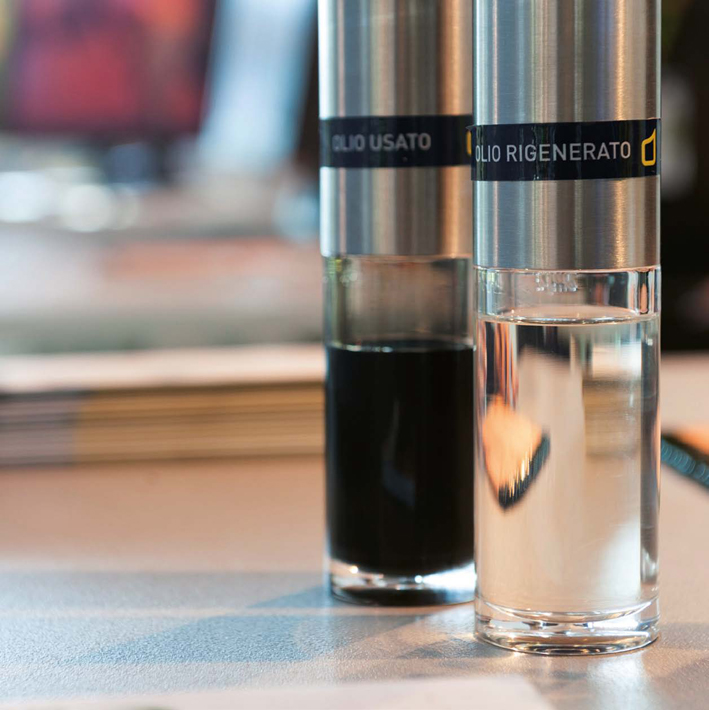The first is a company with structured and complex know-how, of the same technological level needed to turn crude oil into petrol or into a widely-used product. The second is a widespread and efficient technical facility for collection. The third is informed and aware public opinion, namely an advanced society, able to conduct effective communication campaigns to protect the environment.
An overview of Viscolube will enable to grasp the full complexity of such raw material recovery technology applied to used oils.
The company produces re-refined base oils that make 25% of Italy’s lubricating oil sales and has two facilities, one in Pieve Fissiraga (Lodi) and one in Ceccano (Frosinone), with a treatment capacity higher than that of the totality of used oil collected in Italy each year. Such numbers as well as a series of patents regulating one of the most internationally widespread re-refining processes make Viscolube Europe’s leading company in the regeneration of automotive and industrial waste oils.
Thanks to its technological leadership, Viscolube is able to produce lubricating base oils with characteristics and properties that equal – and occasionally exceed – those of new oils as shown by the recent testing carried out by several local governments in Savona, Genoa and Perugia. And it also helps the environment in that every regenerated ton of base oil enables average CO2 savings of 40% compared to the production from crude, thus avoiding combustion or thermodestruction. At a later stage, some additives are supplemented to Viscolube’s regenerated base oils – containing very low levels of sulphur and aromatic compounds – in order to produce the finished lubricating oil used for industrial purposes (hydraulic oils, compressors, bearings, industrial gears etc.) or for the automotive sector.
The Revivoil Process
The company, founded in 1963, produces not only lubricating base oils but also diesel and bitumen. It re-refines used oils through the so-called Revivoil process, developed and patented by Viscolube in collaboration with Axens, a French company which is one the world’s leading businesses in the development of refining processes. The collaboration with Axens enables Viscolube to exploit the familiar hydrofinishing technologies used in crude oil refineries while adapting them to smaller-scale applications. The Revivoil process consists of three stages (see Box). The first two (preflash and thermal deasphalting processes) have been developed and designed by Viscolube, with a limited contribution by Axens. In the third stage (hydrofinishing) the opposite was the case. Viscolube’s base oils are separated in three grades according to their viscosity (very light, light and heavy base oils), with various applications for automotive or industrial uses. On average, from 100 kg of anhydrous waste oil, about 60 kg of regenerated base oil and 25-30 kg of diesel and bitumen are obtained. With the Revivoil process, the regeneration efficiency is 10% higher. The bitumen produced by Viscolube has characteristics suitable for the bituminous coating market, especially in the building industry

“The implementation of the green economy’s policies – as Viscolube’s CEO Antonio Lazzarinetti puts it – involves regenerating. It enables, through a technologically-advanced process such as Revivoil, an efficient use of resources while improving the management of natural capital and the environmental quality of life.”
Confirming this environmental commitment, Viscolube decided to register its products with REACH (Registration, Evaluation, Authorisation and Restriction of Chemicals), the European regulation that came into force in June 2007 aiming at rationalizing and improving the legislative framework concerning chemicals within the European Union.
“It is about – as Marco Codognola, Viscolube’s Sales, Procurement Purchase and Business Development Manager says – a non-mandatory registration for those businesses dealing with regeneration, with a significant added value in the chemical industry in general and in the lubricants sector in particular. We decided to register to highlight the fact that our products have the same characteristics as new oils and our clients can rely on the high and certified quality of our products and production process.”
The Revivoil process
Revivoil involves high-pressure hydrogen treatment to produce oils low in sulphur and saturated elements and with a reduced content of aromatic compounds. The process consists of three stages.
- Preflash. The used oil is heated at 140 °C then it goes through a distillation column with a certain degree of vacuum, in order to separate water from light hydrocarbons.
- Thermal deasphalting. The dehydrated product is distilled at about 360 °C in a vacuum deasphalting column (Tda); at the bottom, asphalt product and bitumen are produced which are simultaneously distilled into three lateral oils graded according to their viscosity. At the top, a semi-finished diesel is obtained.
- Hydrofinishing. It is the adjustment and stabilization stage. Oil and hydrogen are heated at 300 °C in an oven. They then go through a reactor with a catalyst facilitating the reaction of hydrogen with the unsaturated compounds, sulphur and nitrogen. On their way out of the reactor, the liquid and gas phases are separated and the polluting compounds are extracted. The end result is a transparent oil with very low content of sulphur and polynuclear aromatic (Pna).
The importance of technology
“The development of cutting-edge technologies is the supporting element underpinning various waste reutilization processes, but in the treatment sector this is not always the case”, claims Antonio Lazzarinetti. “Regenerating waste oil means it has to undergo complex chemical-physical processes to eliminate its dangerousness while restoring the properties of the original raw material. Our excellence stems from the know-how we have built up over decades of dedicated work, combining operating and plant-engineering experience with the results of a highly-intensive activity of our R&D centre. It is only by constantly improving our plants and processes that we can offer the domestic as well as the international markets a competitive product.”
Over the years, the business has invested heavily in the modernization of its facilities: in 1991, millions of euros were spent for the first thermal desaphalting plant; in 2002, 25 million euros for the hydrofinishing technology; in 2011, 6 million euros for the treatment of lower-quality oils, despite the absence of any legal requirements.
Most of Viscolube’s improvements of the production cycle, though, come from the engineers’ invention as well, since they are constantly faced with the problems of a complex production cycle. Indeed, in the last few years this has led to plant-engineering innovations such as centrifuges and dewaxing systems, already present in the industrial world but engineered so that they could be adapted to the oil regeneration cycle.
 |
|
The re-refining of used oils respects the environments, enabling to upgrade waste, to contain the dependence on non-renewable source producing countries, and to reduce significantly the environmental impact of lubricants. |
Future Projects
Over the coming months, the company intends to further the expansion of the production of the regenerated base oils, from the current 100,000 tons per year, setting up an industrial plan for the plant upgrading. Also, a new initiative will be launched shortly, aimed at raising awareness on the use of regenerated oils in about 150 Italian municipalities, in order to promote green public procurement.

“We hope”, says Marco Codognola, “that the growth in our production will be able to find new opportunities on the Italian market: today, 30% of our sales reach the international market and 70% the domestic one. In Italy, due to the economic crisis, the availability of used oil has declined. It peaked in 2008, with a collection of about 220,000 tons, while we currently collect 175,000 tons. Overall, in 2007, in Italy the total sales of lubricant oils totalled 540,000 tons, while they currently amount to 390,000 tons per year. Given the high appreciation of our technologies and thanks to our success on the foreign markets, we trust that the increase in our production will be able to succeed on foreign markets, in case the Italian one remains stable.”
In addition, Viscolube turns to the foreign markets with the sales of facilities and technologies: there are about ten facilities around the world that are licenced to use Viscolube technology.
“Right now – concludes Marco Codognola – we are looking at the Chinese market very closely, where the sales potential for lubricant oils is twenty times higher than that of the Italian market and China’s domestic production deficit is 50%: of the 8 million tons of annual demand – with an exponential growth – 4 million tons are imported. As a result, it would be important to develop a local supply chain for the production of regenerated base oils. In the regenerating sector, China’s technological level is lagging behind Italy by 10-15 years, so our technology could both offer a real solution to the pressing environmental issues besetting China and an opportunity to produce a fundamental component for the industrial as well as the automotive sector at home.”
Info


